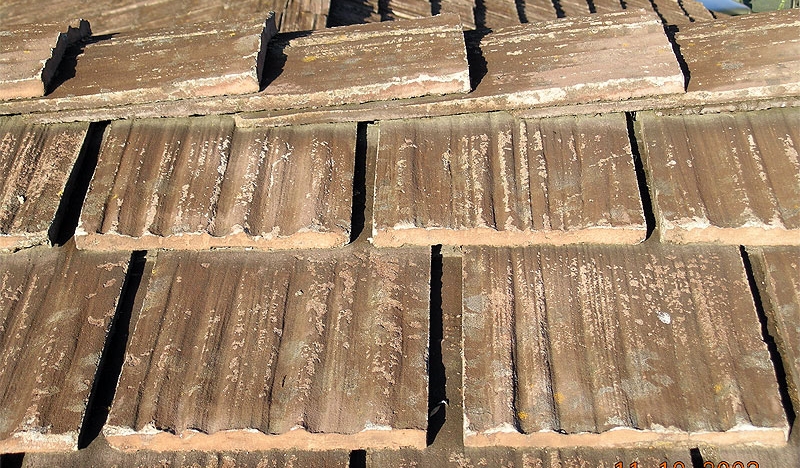When Bill De Lima looks at darkening storm clouds rolling his way, he gets a little anxious and depressed.
It’s not that rain would keep the 72-year-old Danville resident from his favorite hobby – fishing. It’s that storms provide another test for his ailing roof, which was supposed to outlive him by far but which now appears on its last legs.
“When the rain comes, I wonder if it’s going to get worse,” said De Lima, a retired mining equipment manufacturer.
Nine years ago De Lima invested $12,000 in fiber cement shakes made by Cal-Shake for his roof. They replaced the cedar shakes that came with his home. Although the fiber cement shakes cost a couple thousand dollars more than wood shakes, they were appealing because they matched his home, were fire-resistant and came with a 50-year warranty, he said.
Since then, however, the shakes have cracked and crumbled and are encrusted with moss and bloated from trapped water. The interior of the house has multiple leaks and rafters are showing visible signs of stress from the heavy, waterlogged shakes.
“The worse part about it is it’s going to cost me twice as much to put on another roof,” said De Lima. “When you live on fixed income, you don’t have $25,000 to do that.”
De Lima’s plight is being played out in thousands of homes across California and the West. The fiber cement shakes, an innovative reroofing material that emerged 20 years ago, have failed in many cases to live up to the 30- and 50-year life expectancies of their warranties. Instead, many homeowners are having to replace their roofs just five to 10 years after they were installed, an Examiner/KTVU report shows.
Some estimates put the number of fiber shake roofs in the state at 100,000, with half of them in Northern California. Thousands of others were sold in Washington, Oregon, Idaho and Colorado.
The fiber cement products have spawned several class-action lawsuits against some of the biggest manufacturers of the replacement shakes.
The parent company of one of the largest fiber cement manufacturers agreed in December to a tentative settlement in a class-action suit worth at least $105 million. Weyerhaeuser Co. Ltd. of Vancouver, B.C., owns the remnants of American Cemwood Corp., which went out of business in 1998.
Attorneys representing the consumers in the class action estimated that American Cemwood may have sold shakes to at least 35,000 homeowners, with perhaps 20,000 to 25,000 of them in California. A judge will rule on the tentative settlement in May.
Cemwood customers who feel they have significant roof damage can call 1-800-708-3266 to learn more information about the settlement or to obtain a claim form. None of the other cases against major manufacturers has reached a settlement phase.
Weyerhaeuser attorney John Phillips said the settlement was not an admission of wrongdoing, but an attempt to address the concerns of Cemwood customers.
“We’re just trying to assist in the resolution of the claims that arose from the performance of the roofing product,” said Phillips.
American Cemwood was not the only producer of fiber cement shakes. Throughout the ’80s, companies like Cal-Shake and Recon Building Products started making large numbers of the shakes. Both are being sued because of similar problems that attorneys say are inherent with the whole class of material.
Alamo attorney David Birka-White, who is pursuing class actions against Cal-Shake and Recon, said the shakes appeared to have been a flawed concept.
“Generally speaking, these products started to fail after five years,” said Birka-White.
He said that while lawsuits are moving forward, many homeowners may not realize they have a problem. Some of the shakes sold in the ’90s are only now beginning to deteriorate. Therefore, some homeowners who don’t scrutinize their roofs may not be aware of problems.
Read article on SF Gate website.By Ryan Kim, OF THE EXAMINER STAFF Published 4:00 am, Sunday, February 20, 2000

